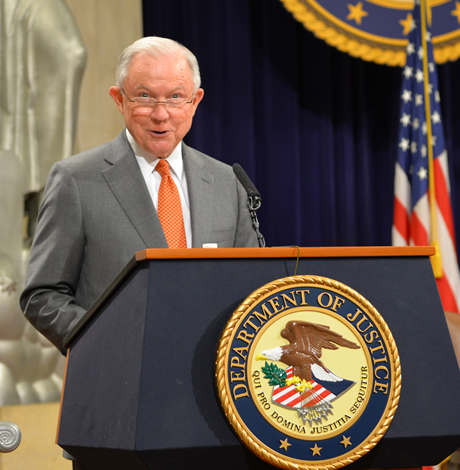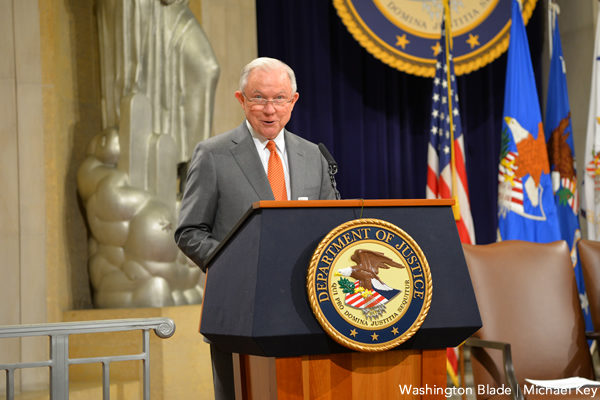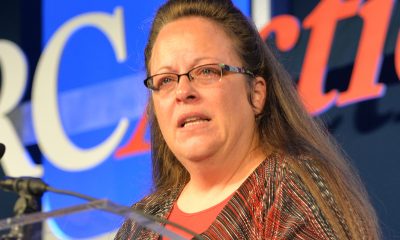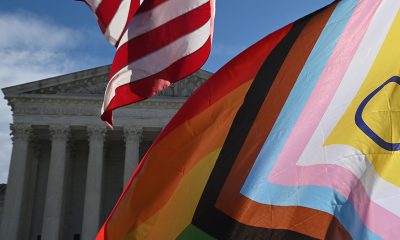News
DOJ touts anti-LGBT views, task force at ‘religious freedom’ summit
Sessions accused of ‘undermining LGBTQ rights’


Attorney General Jeff Sessions announced the creation of a Religious Liberty Task Force. (Washington Blade photo by Michael Key)
A summit at the U.S. Justice Department on Monday ostensibly intended to promote religious freedom, including the creation of a Religious Liberty Task Force, often highlighted efforts to enable anti-LGBT discrimination.
At the summit in the Justice Department’s Great Hall, U.S. Attorney General Jeff Sessions announced the creation of the task force to implement “religious freedom” guidance he issued last year.
“The task force will help the department fully implement our religious liberty guidance by ensuring that all Justice Department components — and we got a lot of components around the country — are upholding that guidance in the cases they bring and defend, the arguments they make in court, the policies and regulations they adopt and how we conduct our operations,” Sessions said.
According to the Justice Department, Sessions will serve as chair of the task force, which will be co-chaired by Acting Associate Attorney General Jesse Panuccio and Associate Attorney General for the Office of Legal Policy Beth Williams.
Sessions said a primary mission of the Religious Liberty Task Force will be ensuring Justice Department employees “know their duty is to accommodate people of faith.”
“This administration is animated by the same American view that has led us for 242 years that every American has a right to believe and worship and exercise their faith in the public square,” Sessions added.
The underlying guidance on which the task force is based seeks to allow individuals and businesses to act in the name of religious freedom — often used as an exercise for anti-LGBT discrimination — without fear of government reprisal. Nowhere in the guidance is there a limiting principle assuring the right to free exercise of religion should be an excuse to engage in anti-LGBT discrimination.
Announcing the new task force, Sessions referenced the Masterpiece Cakeshop case in which a Colorado baker was sued after he refused to make a custom-made wedding cake for a same-sex couple. The U.S. Supreme Court narrowly ruled in his favor based on the facts of his case, citing anti-religion sentiment on the Colorado Civil Rights Commission.
Sessions commended Phillips for having endured an “ordeal faced so gravely,” touting an amicus brief the Justice Department filed on his behalf before the Supreme Court. U.S. Solicitor General Noel Francisco also argued in favor of Phillips before justices in oral arguments.
“Let’s be frank: A dangerous movement, undetected by many, but real, is now challenging and eroding our great tradition of religious freedom,” Sessions said at the start of his remarks. “There can be no doubt, it’s no little matter. It must be confronted intellectually and politically, and defeated.”
LGBT rights supporters said in response to the creation of the Religious Liberty Task Force its purpose was to further the Trump administration’s goal of compromising LGBT rights.
Louise Melling, deputy legal director for the American Civil Liberties Union, said the agenda of the Religious Liberty Task Force “isn’t consistent with religious freedom.”
“Religious freedom protects our right to our beliefs, not a right to discriminate or harm others,” Melling said. “Jeff Session’s Department of Justice is again turning that understanding of religious freedom on its head.”
Lucas Acosta, director of LGBTQ media for the Democratic National Committee, said in a statement the task force is “just the latest assault in this administration’s continued campaign against LGBTQ people and our civil rights.”
“By creating this task force, Sessions is establishing a unit dedicated to undermining LGBTQ rights and giving anti-LGBTQ far-right extremists like task force head Jesse Panuccio a taxpayer-funded platform to push their anti-equality agenda,” Acosta said. “Rather than ensuring every person has equal protections and opportunities, Sessions is shamefully doubling down on bigotry.”
But the creation of the Religious Liberty Task Force was just one portion of the summit, which also included the voices of participants who urged a commitment to religious freedom to advance anti-LGBT discrimination.
Archbishop of Louisville Joseph Edward Kurtz, who formerly served as president of the U.S. Conference of Catholic Bishops, said religious freedom is facing challenges that amount to “power-seeking for the purpose of imposing one’s will on others.”
Kurtz cited as an example Catholic adoption agencies being “targeted for closure” for refusing to place children with LGBT families out of religious objections.
“One of the biggest concerns is the ability of our child welfare providers to continue to be able to place children with foster and adoptive families consistent with our teaching,” Kurtz said.
Although no government is actively seeking to close Catholic adoption agencies, they have threatened to shut their doors on their own in the wake of the legalization of same-sex marriage because they feel they’ll be forced to place children with gay couples who marry.
As a result, a growing number or states have enacted anti-LGBT adoption laws allowing taxpayer-funded agencies to refuse to place children with LGBT families over religious objections. House Republicans have inserted an amendment in a pending appropriations bill that would penalize states and localities for having policies barring anti-LGBT discrimination among adoption agencies.
Phillips, the owner of Masterpiece Cakeshop, was himself present at the summit and took part in a panel of individuals who say they are facing challenges to their religious freedom.
Moderating his panel was Justice Department spokesperson Kerri Kupec, formerly a spokesperson for the anti-LGBT Alliance Defending Freedom. At a time when that term is used as justification for anti-LGBT discrimination, Kupec said in her introduction of the panel religious freedom is often “housed in scare quotes, as if it’s not a real thing, or even worse, a bad thing, which is tragic.”
Much of Kupec’s questioning of Phillips sought to elicit sympathy for him, which meant his act of refusing to make a custom-made wedding cake for a same-sex couple who entered his store was glossed over as he explained his commitment to his religious views.
In addition to refusing to make a same-sex wedding cake, Phillips said his religious beliefs compel him to close on Sundays, refuse to service Halloween celebrations or make cakes with denigrating messages.
“It’s the message of the cake that I evaluate, not the person who ordered the cake,” Phillips said. “In one instance, I had a man who wanted me to make a cake basically telling his boss that he was a jerk, so I wouldn’t do that, but I’ve also had people asked me to do cakes that would disparage gay people, the gay lifestyle, but I wouldn’t do that either because they’re hurtful cakes.”
As the litigation went forward, Phillips said he received death threats as well as a threat over the phone against his daughter. As a result, Phillips said he wouldn’t allow employees to answer the phone at Masterpiece Cakeshop and would only take calls himself.
Noting the U.S. Supreme Court only takes a few select cases each year, Phillips became emotional when he recalled news that justices had agreed to take up his petition after the state of Colorado ruled against him.
Even though the result of the case was narrowly in his favor and didn’t open up a First Amendment right for anti-LGBT discrimination, Phillips said it was worth the effort.
“True tolerance has to be a two-way street,” Phillips said. “We’re thrilled that the United States ruled in our favor, this ruling solidifying religious freedom in our country, but it’s not just for me, it’s for all us, every American should now be able to live and work freely and according to their conscience without fear of punishment from the government.”
Other speakers at the summit expressed concerns about threats to religious minorities in a manner that progressives would likely agree is a threat to religious freedom.
Among them was Harpreet Singh, who works with Muslim, Arab, Sikh, South Asian and Hindu religions on behalf of the Justice Department, and Asma Uddin, senior scholar at the Religious Freedom Center of the Freedom Forum Institute, who talked about anti-Muslim sentiments.
Singh said his agency has found hate crimes against minority religions have been increasing, which he said is substantiated by the Federal Bureau of Investigation’s annual reports and studies from universities, although “there’s a lot of underreporting going on.”
But other speakers on the panel railed against efforts to uphold LGBT rights as they face compromise in the name of religious freedom, including Emilie Kao, director of the Richard & Helen DeVos Center for Religion & Civil Society at the anti-LGBT Heritage Foundation.
Kao was critical of litigation filed by the ACLU against the Michigan law enabling Catholic adoption agencies to refuse placement to LGBT families over religious objections.
Asserting same-sex couples seeking to adopt face no problem in access to adoption, Kao said the plaintiff in the lawsuit drove past four other adoption agencies to reach St. Vincent’s Catholic Charities, which she said “still holds the belief that they should put every child with a mother and father.”
“The lesbian couple says they were personally offended by St. Vincent’s not placing a child with them,” Kao said. “I think it’s important for us to recognize that throughout the history of our country and the Supreme Court’s cases, we have always protected the right of people to follow their religious beliefs, and we’ve never protected the right not to have your feelings hurt.”
Michael McConnell, a law professor at the Constitutional Law Center at Stanford University, warned of the growing compromise that religious liberty faces in the wake of growing “sexual freedom.”
“An extremely popular argument in religious circles has been that religious accommodations are necessarily unconstitutional if they lead to so-called third-party harm,” McConnell said. “If there’s anyone whose rights or interests…are interfered with, that that means the accommodation is simply unconstitutional. To my mind, that’s an extremely implausible argument because virtually every accommodation, and indeed, virtually any application of any constitutional right — free speech, property, due process — there’s always someone on the other side of ledger who’s interests are being harmed.”

Texas state Rep. James Talarico won a hard-fought primary Tuesday to become the state’s Democratic nominee for U.S. Senate, defeating U.S. Rep. Jasmine Crockett in one of the year’s most closely watched and competitive Democratic contests.
Talarico, a Presbyterian seminarian and three-term lawmaker from Round Rock, was declared the winner by the Associated Press early Wednesday morning after a closely tracked vote count that drew national attention.
“Tonight, the people of our state gave this country a little bit of hope,” Talarico told the AP. “And a little bit of hope is a dangerous thing.”
With 52.8% of the vote to Crockett’s 45.9%, Talarico secured the nomination outright, avoiding a runoff and capping months of sharp contrasts between the two candidates over strategy, messaging, and how best to compete statewide in Texas. Democrats hope the competitive primary — and the relatively narrow margin — signals growing momentum in a state that has not elected a Democrat to the U.S. Senate since 1988.
Talarico has long expressed support for the LGBTQ community, a position he highlights prominently on his campaign website. Under the “Issues” section, he directly addresses assumptions that might arise from his faith and background as a seminarian in a deeply conservative state.
“My faith in Jesus leads me to reject Christian Nationalism and commit myself to the project of democracy,” his website reads. “Because that’s the promise of America: a democracy where every person and every family — regardless of religion, race, gender, sexual orientation, or any other difference between us — can truly be free and live up to their full potential.”
Crockett struck a conciliatory tone following her defeat, emphasizing party unity ahead of November.
“This morning I called James and congratulated him on becoming the Senate nominee,” Crockett told Politico. “Texas is primed to turn blue and we must remain united because this is bigger than any one person. This is about the future of all 30 million Texans and getting America back on track.”
Talarico also drew national attention earlier in the race when “Late Show” host Stephen Colbert said he was initially unable to air an interview with the state legislator due to potential FCC concerns involving CBS. The episode sparked a broader political debate.
Brendan Carr, chair of the Federal Communications Commission, appointed by President Donald Trump, told reporters the controversy was a “hoax,” though he also acknowledged Talarico’s ability to harness the moment to build support as an underdog candidate. The interview was later released online and garnered millions of views, boosting Talarico’s national profile.
In November, Talarico will face the winner of the Republican primary between incumbent Sen. John Cornyn and Texas Attorney General Ken Paxton, who have been locked in a bruising GOP contest. Rep. Wesley Hunt was also in the Republican primary field. The GOP race is expected to head to a May runoff.
In a joint statement, Senate Minority Leader Chuck Schumer and Democratic Senatorial Campaign Committee Chair Kirsten Gillibrand praised Talarico’s victory and framed him as a candidate capable of broad appeal.
“As an eighth-generation Texan, former middle school teacher, and Presbyterian seminarian, James will be a fighter for Texans from all walks of life and of all political stripes,” they said. “In November, Texans will elect a champion for working people: James Talarico.”
Maryland
Md. Commission on LGBTQIA+ Affairs released updated student recommendations
LGBTQ students report higher rates of bullying, suicide

The Maryland Commission on LGBTQIA+ Affairs has released updated recommendations on how the state’s schools can support LGBTQ students.
The updated 16-page document outlines eight “actionable recommendations” for Maryland schools, supplemented with data and links to additional resources. The recommendations are:
- Developing and passing a uniform statewide and comprehensive policy aimed at protecting “transgender, nonbinary, and gender expansive students” against discrimination. The recommendation lists minimum requirements for the policy to address: name, pronoun usage, and restroom access.
- Requiring all educators to receive training about the specific needs of LGBTQ students, by trained facilitators. The training’s “core competencies” include instruction on terminology, data, and support for students.
- Implementing LGBTQ-inclusive curricula and preventing book bans. The report highlights a “comprehensive sexual education curriculum” as specifically important in the overall education curriculum. It also states the curriculum will “provide all students with life-saving information about how to protect themselves and others in sexual and romantic situations.”
- Establishing Gender Sexuality Alliances “at all schools and in all grade levels.” This recommendation includes measures on how to adequately establish effective GSAs, such as campaign advertising, and official state resources that outline how to establish and maintain a GSA.
- Providing resources to students’ family members and supporters. This recommendation proposes partnering with local education agencies to provide “culturally responsive, LGBTQIA+ affirming family engagement initiatives.”
- Collecting statewide data on LGBTQ youth. The data on Maryland’s LGBTQ youth population is sparse and non-exhaustive, and this recommendation seeks to collect information to inform policy and programming across the state for LGBTQ youth.
- Hiring a full-time team at the Maryland Department of Education that focuses on LGBTQ student achievement. These employees would have specific duties that include “advising on local and state, and federal policy” as well as developing the LGBTQ curriculum, and organizing the data and family resources.
- Promoting and ensuring awareness of the 2024 guidelines to support LGBTQ students.
The commission has 21 members, with elections every year, and open volunteer positions. It was created in 2021 and amended in 2023 to add more members.
The Governor’s Office of Communication says the commission’s goal is “to serve LGBTQIA+ Marylanders by galvanizing community voices, researching and addressing challenges, and advocating for policies to advance equity and inclusion.”
The commission is tasked with coming up with yearly recommendations. This year’s aim “to ensure that every child can learn in a safe, inclusive, and supportive environment.”
The Human Rights Campaign’s most recent report on LGBTQ youth revealed that 46.1 percent of LGBTQ youth felt unsafe in some school settings. Those numbers are higher for transgender students, with 54.9 percent of them saying they feel unsafe in school.
Maryland’s High School Youth Risk Behavior Survey reveals a disparity in mental health issues and concerns among students who identify as LGBTQ, compared to those who are heterosexual. LGBTQ students report higher rates of bullying, feelings of hopelessness, and suicidal thoughts. Nearly 36 percent of LGBTQ students report they have a suicide plan, and 26.7 percent of respondents say they have attempted to die by suicide.
The commission’s recommendations seek to combat the mental health crisis among the state’s LGBTQ students. They are also a call for local and state governments to work towards implementing them.
Virginia
Va. lawmakers consider partial restoration of Ryan White funds
State Department of Health in 2025 cut $20 million from Part B program

The Virginia General Assembly is considering the partial restoration of HIV funding that the state’s Department of Health cut last year.
The Department of Health in 2025 cut $20 million — or 67 percent of total funding — from the Ryan White Part B program.
The funding cuts started with the Trump-Vance administration passing budget cuts to federal HIV screening and protection programs. Rebate issues between the Virginia Department of Health and the company that provides HIV medications began.
Advocates say the funding cuts have disproportionately impacted lower-income people.
The Ryan White HIV/AIDS Program, a federal program started in 1990, provides medical services, public education, and essential services. Part B offers 21 services, seven of which remained funded after the budget cuts.
Equality Virginia notes “in 2025, a 67 percent reduction severely destabilized HIV services across the commonwealth.”
Virginia lawmakers have approved two bills — House Bill 30 and Senate Bill 30 — that would partially restore the funding. The Ryan White cuts remain a concern among community members.
Both chambers of the General Assembly must review their proposed changes before lawmakers can adopt the bills.
“While these amendments aren’t a full restoration of what community-based organizations lost, this marks a critical step toward stabilizing care for thousands of Virginians living with HIV,” said Equality Virginia Executive Director Narissa Rahaman. “Equality Virginia plans to continue their contact with lawmakers and delegates through the conference and up until the passing of the budget.”
“We appreciate lawmakers from both sides of the aisle who recognized the urgency of this moment and will work to ensure funding remains in the final version signed by the governor,” added Rahaman.


















